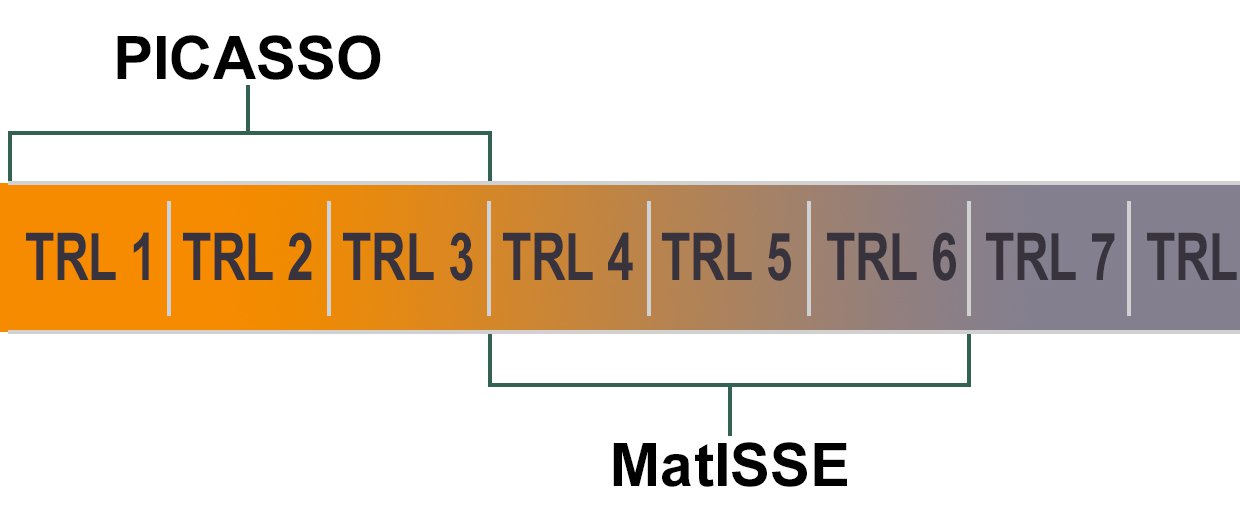The Planetary Instrument Concepts for the Advancement of Solar System Observations (PICASSO) Program supports the development of spacecraft-based instrument systems that show promise for use in future planetary missions. The goal of the program is to conduct planetary and astrobiology science instrument feasibility studies, concept formation, proof of concept instruments, and advanced component technology development (technology readiness levels (TRL) 1 – 3) to the point where they may be proposed in response to the Maturation of Instruments for Solar System Exploration (MatISSE) Program.
PICASSO is now a program with no-due-dates (NoDD). For more information about NoDD in PSD, visit: https://science.nasa.gov/researchers/NoDD
A full list of Program Officers can be found at: https://science.nasa.gov/researchers/sara/program-officers-list/.
Visit the Research Opportunities in Space and Earth Sciences 2024 (ROSES-2024) call for this and other funding opportunities.
Check ROSES-2024 TABLE 2: Solicited Research Programs for proposal due dates.
The NASA Solicitation and Proposal Integrated Review and Evaluation System (NSPIRES) contains information on all NASA-funded research opportunities. Be sure to create an NSPIRES account to receive updates and to respond to NASA research announcements.
The Maturation of Instruments for Solar System Exploration (MatISSE) Program supports the advanced development of spacecraft-based instruments that show promise for use in future planetary missions. The entry level Technology Readiness Level for this program has been raised to TRL 4 in order to more clearly differentiate this program from the PICASSO program. The goal of the program is to develop and demonstrate planetary and astrobiology science instruments to the point where they may be proposed in response to future announcements of flight opportunity without additional extensive technology development (approximately technology readiness level (TRL) 6). The proposed instrument must address specific scientific objectives of likely future planetary science missions.
A full list of Program Officers can be found at: https://science.nasa.gov/researchers/sara/program-officers-list/.
Visit the Research Opportunities in Space and Earth Sciences 2024 (ROSES-2024) call for this and other funding opportunities.
Check ROSES-2024 TABLE 2: Solicited Research Programs for proposal due dates.
The NASA Solicitation and Proposal Integrated Review and Evaluation System (NSPIRES) contains information on all NASA-funded research opportunities. Be sure to create an NSPIRES account to receive updates and to respond to NASA research announcements.
- NNH22ZDA001N-PICASSO Selected Abstracts (Updated October 19, 2022)
- NNH21ZDA001N-PICASSO 2021 Selected Abstracts
- NNH20ZDA001N-PICASSO 2020 Selected Abstracts
- NNH19ZDA001N-PICASSO 2019 Selected Abstracts
- NNH18ZDA001N 2018 Selected Abstracts
- NNH17ZDA001N-PICASO 2017 Selected Abstracts
- NNH16ZDA001N-PICASSO 2016 Selected Abstracts
- NNH15ZDA001N-PICASO15_2 2015 Selected Abstracts
- NNH14ZDA001N-PICASSO 2014 Selected Abstracts
- NNH13ZDA001N-PICASSO 2013 Selected Abstracts
Selected PICASSO Proposals
- NNH23ZDA001N-MATISSE Not Solicited
- NNH22ZDA001N-MATISSE 2022 Selected Abstracts (Updated 7/11/23)
- NNH21ZDA001N-MATISSE 2021 Not Solicited
- NNH20ZDA001N-MATISSE 2020 Selected Abstracts
- NNH19ZDA001N-MATISSE 2019 Not Solicited
- NNH18ZDA001N-MATISSE 2018 Selected Abstracts
- NNH17ZDA001N-MATISSE 2017 Not Solicited
- NNH16ZDA001N-MATISSE 2016 Selected Abstracts
- NNH14ZDA001N-MATISSE 2014 (updated 2015) Selected Abstracts
- NNH13ZDA001N-MATISSE 2013 Selected Abstracts
- NNH12ZDA001N-MATISSE 2012 Selected Abstracts
Selected MatISSE Proposals
Astrobiology Science and Technology Instrument Development (ASTID)
Prior to 2013, NASA’s Planetary Science Division had two major instrument development programs: the Planetary Instrument Definition and Development Program (PIDDP) and the Astrobiology Science and Technology for Instrument Development (ASTID) Program. However, the combination of PIDDP and ASTID did not truly constitute an instrument development pipeline, and to completely develop an instrument to the point where it could be proposed for a mission required repeated and costly proposals to both programs. Exacerbating this problem was the lack of a program which explicitly supported the maturation of technologies from TRL 4 to 6—the so-called “valley of death.”
The Planetary Science Division restructured its instrument development programs in 2013 to ease the full development and maturation of instrument technologies across all of the Division’s goals. The “Planetary Instrument Concepts for the Advancement of Solar System Observations Program,” PICASSO, supports the definition and development of instruments TRLs 1 through 3 for all planetary science goals. The “Maturation of Instruments for Solar System Exploration Program,” MatISSE, similarly supports the maturation of instruments TRLs 3 through 6. Together, PICASSO and MatISSE form an integrated pipeline for taking instruments from initial concepts to prototypes able to be proposed for missions.

